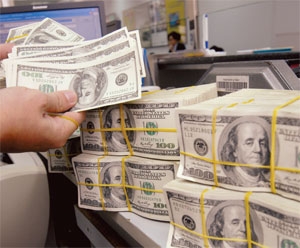Uniform forex move may miss the point
 Under the draft amended ordinance (new draft), not only transactions, payments, listings and advertisements in foreign currencies but also quotations, use of foreign currencies in determining prices in contracts and agreements or other similar forms will fall within the restricted scope of the drafted provision.
Under the draft amended ordinance (new draft), not only transactions, payments, listings and advertisements in foreign currencies but also quotations, use of foreign currencies in determining prices in contracts and agreements or other similar forms will fall within the restricted scope of the drafted provision.
On the one hand, the new wording will end the long-standing debate over the vague meaning and scope of “transactions effected in foreign currency” under the current ordinance. On the other hand, it will ring an alarm to activities in which wages, rental prices, real estate purchase contracts and a wide range of other goods and services commonly quoted in foreign currencies or adjustable according to fluctuations of exchange rates.
Notably, this clarification will also bring light to the question of the validity of those contracts being priced in foreign currencies, but payment is made in VND. At present the Resolution No. 04/2003 issued by the Judge Council under the Supreme People’s Court suggests that these contracts are valid and enforceable. Under the new draft, the risks of the said contracts being rendered invalid would become more apparent.
Last but not least, the new draft will pave the way for comprehensive sanction regulations imposing strong penalties on a wider range of regulation violations on restricted use of foreign exchange. Under the new draft, the State Bank will also be delegated the power to decide which case is exempted from these restrictions (on a case-by-case basis or by specific decisions).
Why is the big deal?
Apparently, determining prices in a foreign currency as a convenient instrument to stabilise a contract’s value will no longer be available. Given the fact that the VND has historically been losing its value, those who feel sorry most for this regulatory change are goods and services providers (including many local importers and FDI enterprises) having their inputs dependent on imported materials or overseas services.
If their contracts, especially those with price fixed for a long-term or payments not settled quickly are priced in VND. The depreciation of VND against foreign currencies will always cause losses and instability to their revenue and profits. With the new draft, these enterprises have not only been prohibited to “transact” in foreign currencies, but also lost their freedom of passing the exchange risk to clients.
Other less hurt people are those white-collars working in FDI enterprises, branches of foreign companies and Business Cooperation Contract-BCC project offices, who are usually offered wages determined in USD. Under the new draft, employment contracts having wages in USD must be converted into VND.
Available solutions at hand
In an effort to preserve their contract value, businesses are putting forward various innovative structures to determine contract price, such as price formula/price review regime based on price indices (CPI, PPI, Steel Prices Index, construction price indices, etc). Hedging forex exposure by accepting a fixed mark-up on the price to reflect the estimated depreciation of VND is another approach. However, this structure only works if the value of VND gradually decreases and a mutually agreed mark-up rate could be achieved.
Is using SDR a good choice?
It is worth noting that those restrictions only apply to the use of foreign currencies which are defined in the new draft as “currencies of other nations or the common European currency and other common currencies used in international and regional payments”. It appears that anchoring contract price to a stable currency-related index is still preferred if this action is not banned. In regards to this issue, Special Drawing Rights (SDR) might be an appropriate instrument.
Firstly, SDR price is calculated based on a money basket of four convertible currencies (EUR, GBP, USD and JPY) and announced on a daily basis by the IMF which makes SDR easily accessible and effective to stabilise a contract’s value. Secondly, as SDR is not a real currency but a unit of account, it is not likely to qualify as a foreign currency and would escape from the above-mentioned restrictions as well as future State Bank monetary policies.
To conclude, as the value of the domestic currency is unstable, rather than accepting to live with their revenues in VND, enterprises have and will still try hard to find other methods to preserve the real values of their capital and profits. Therefore, policy-makers should take due care of the balance of interests among different business players of the economy while imposing a new regulation with far-reaching implication such as the amended Ordinance on forex controls.
What the stars mean:
★ Poor ★ ★ Promising ★★★ Good ★★★★ Very good ★★★★★ Exceptional
Related Contents
Latest News
More News
- Cashless payments hit 28 times GDP in 2025 (February 04, 2026 | 18:09)
- SSIAM and DBJ launch Japan Vietnam Capital Fund (February 04, 2026 | 15:57)
- Banks target stronger profits, credit growth in 2026 (February 04, 2026 | 15:43)
- Vietnam on path to investment-grade rating (February 03, 2026 | 13:07)
- Consumer finance sector posts sharp profit growth (February 03, 2026 | 13:05)
- Insurance market building the next chapter of protection (February 02, 2026 | 11:16)
- NAB Innovation Centre underscores Vietnam’s appeal for tech investment (January 30, 2026 | 11:16)
- Vietnam strengthens public debt management with World Bank and IMF (January 30, 2026 | 11:00)
- Corporate bond market poised for stronger growth cycle (January 28, 2026 | 17:13)
- Vietnam's IPO market on recovery trajectory (January 28, 2026 | 17:04)

 Tag:
Tag:




















 Mobile Version
Mobile Version